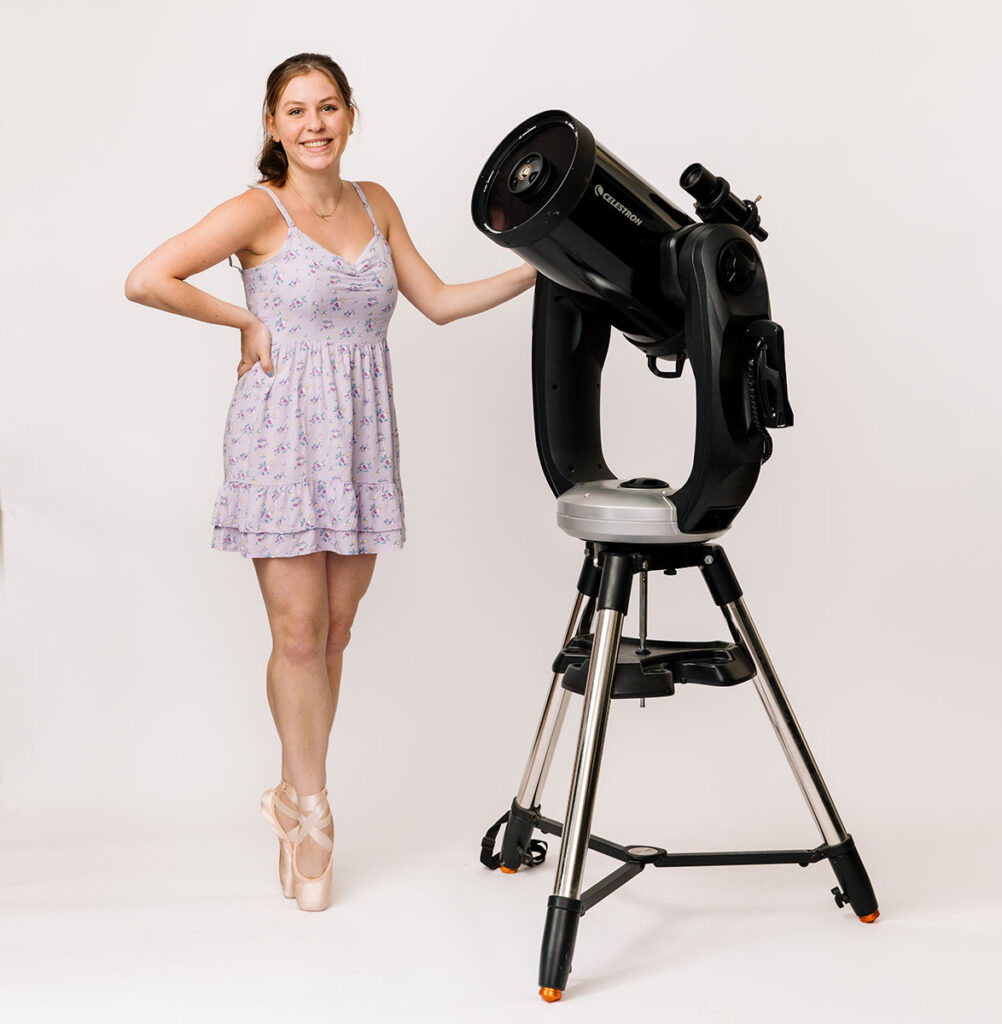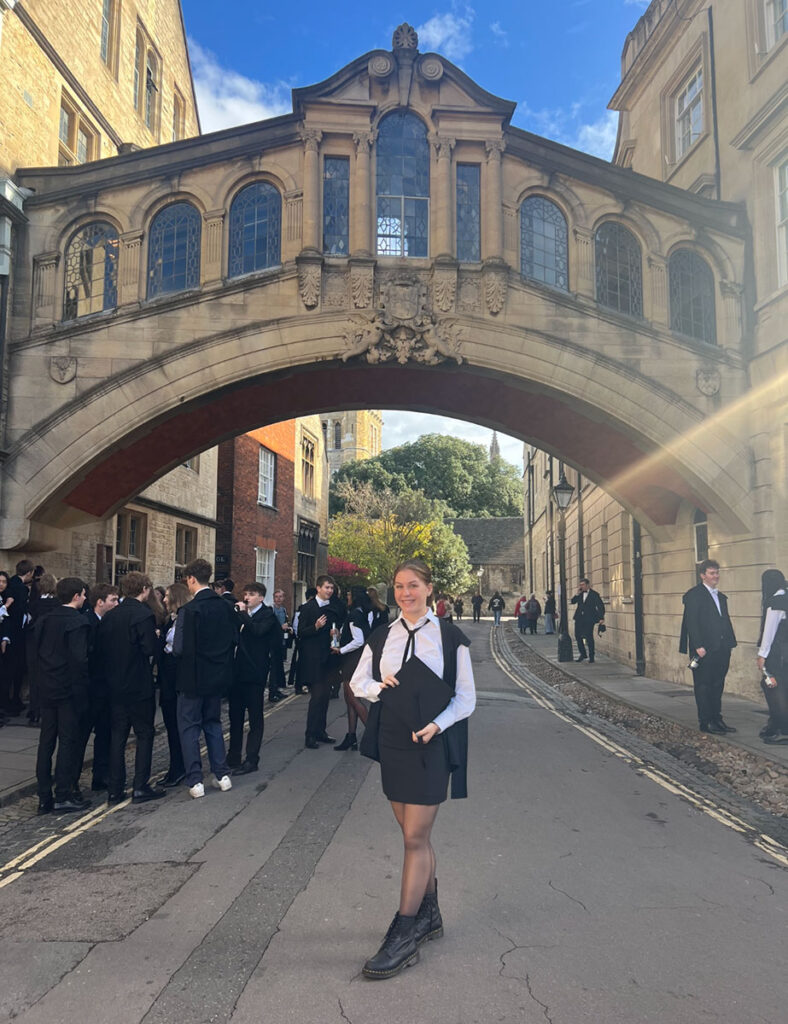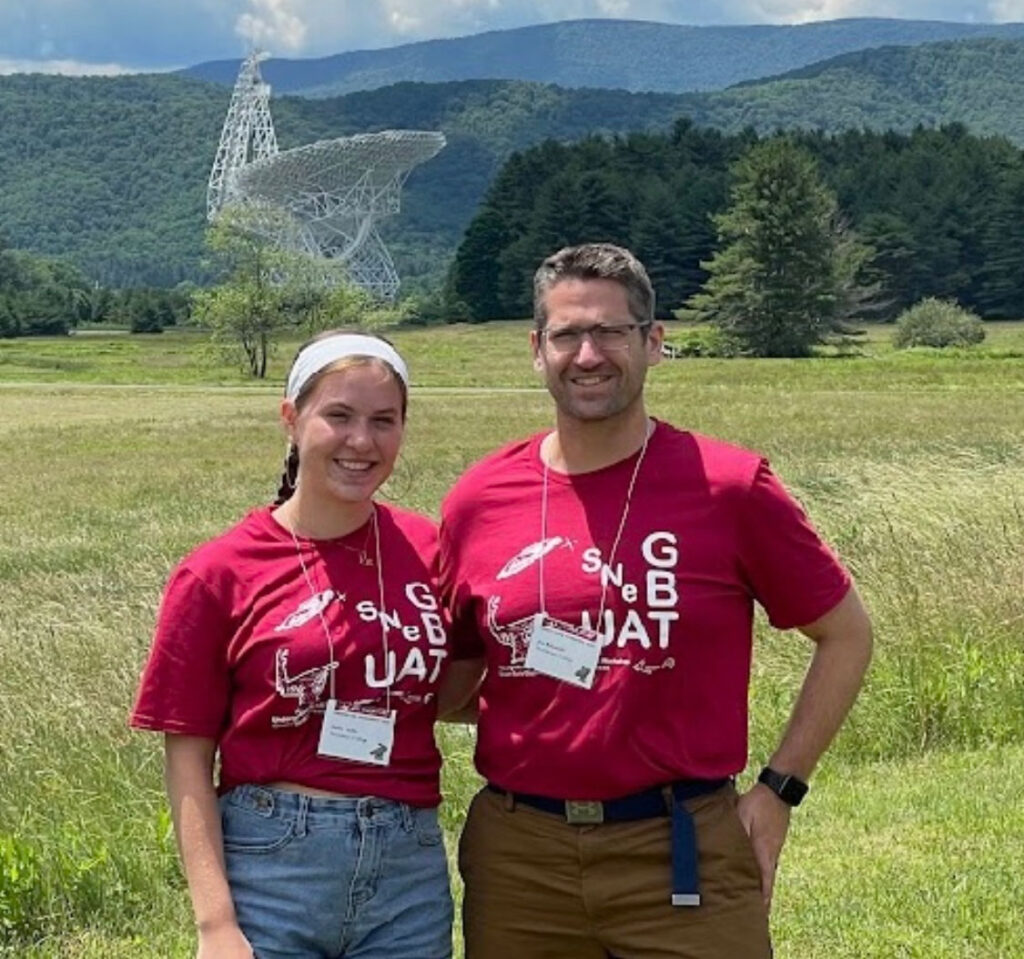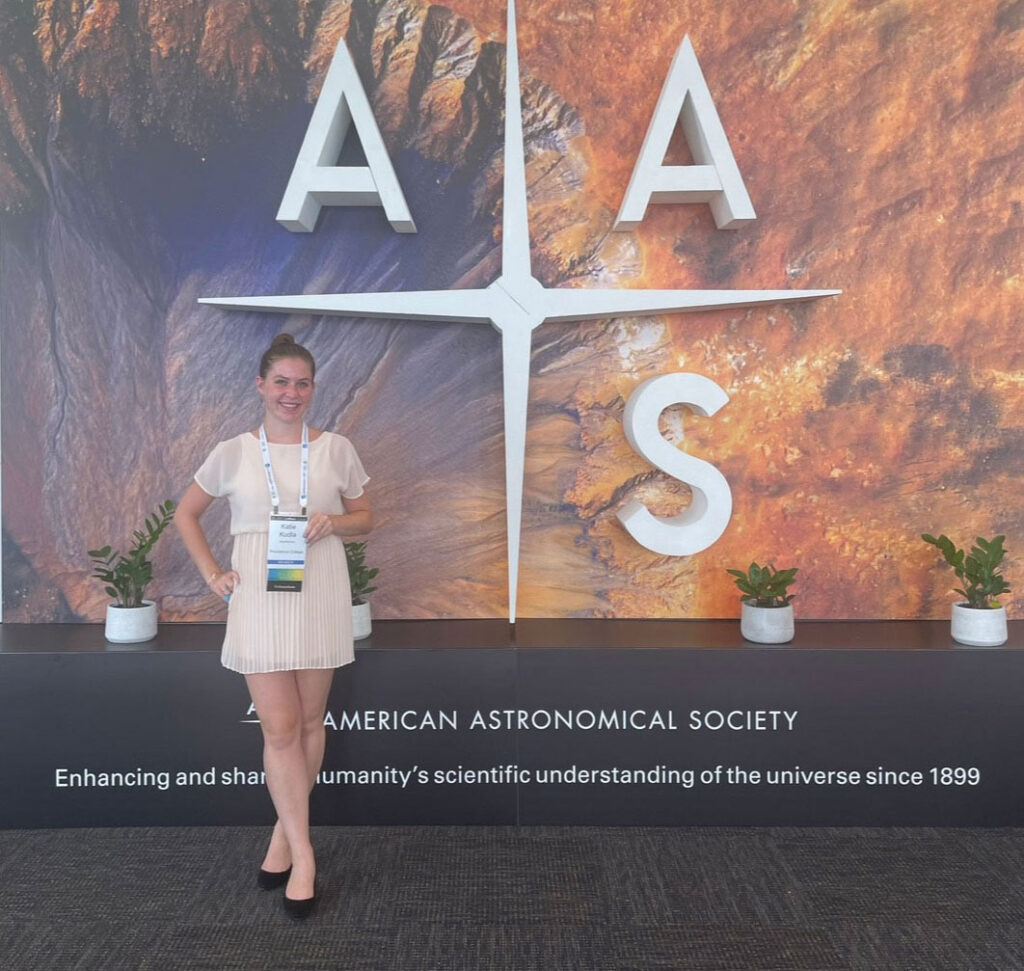Physics major Katie Kudla ’24 wins Goldwater Scholarship, prestigious honors
Editor’s note: After graduation, Katie Kudla ’24 will pursue a Ph.D. in physics with an astrophysics emphasis at the University of California, Santa Barbara. She will work under professor Crystal Martin to study galaxy formation and evolution.
By Vicki-Ann Downing
As a woman and an astrophysicist, Katie Kudla ’24 is used to being a person apart. Now she has another distinction: She is one of only 413 students, from 5,000 applicants nationwide, to receive the Goldwater Scholarship, the most prestigious undergraduate scholarship in the United States in engineering, mathematics, and the natural sciences.
The Goldwater is one of many honors for Kudla:
- She was selected to attend the 73rd Lindau Nobel Laureate Meeting in Lindau, Germany, in June 2024, after a competitive, multi-stage application and nomination process. She will be among 600 young scientists and 30 Nobel laureates. The scientific program will focus on quantum physics and quantum technologies, physics-based solutions to the energy challenge, and artificial intelligence in physics.
- At the BIG East Research Symposium held at Madison Square Garden in New York City in March 2024 during the BIG EAST basketball tournament, Kudla’s project, Mapping Star Formation Histories in Nearby Galaxies to Understand the Early Universe, received honorable mention. She finished fourth in the judging out of 55 projects.
- Kudla won the top presenter award in the category of undergraduate physics and astronomy at the International Forum on Research Excellence in November 2023 in Long Beach, California.

Kudla is the third Providence College student in the past four years to receive the Goldwater award. The previous recipients were Emma McLaughlin ’20, an applied physics major now studying for a Ph.D. in physics at Columbia University, and Colby Agostino ’22, a chemistry and computer science double major now studying for a Ph.D. in biochemistry and molecular biophysics at the University of Pennsylvania’s Perelman School of Medicine.
Kudla received $7,500 from the Barry Goldwater Scholarship and Excellence in Education Foundation to use toward her education or for future research. In her first three years at PC, she received two summer fellowships from the NASA Rhode Island Space Grant Consortium, presented research at the American Astronomical Society’s 240th meeting in Pasadena, California, and visited the Robert C. Byrd radio telescope at the Green Bank Observatory in West Virginia. She also spent a semester as a visiting student at St. Edmund Hall at the University of Oxford, studying physics and mathematics, two male-dominated fields, alongside other Oxford students.
“Beyond her research efforts, Katie is an elite student,” said Joseph Ribaudo, Ph.D., assistant professor of physics. “She has an unparalleled academic record at Providence and her semester abroad at Oxford is evidence of her ability to succeed in even the most rigorous academic environments.”
Kudla has worked on research with Ribaudo since her first year at PC. She describes their work as the study of the relationship between the baryonic (stellar and gas) mass of a galaxy and its rotational velocity. Officially, the project is entitled “The Baryonic Tully-Fisher Relation for Galaxies with Supernova Distances,” and it is the primary focus of the Undergraduate ALFALFA Team, a radio astronomy research collaboration with Ribaudo as principal investigator.
Kudla discovered her love for physics in an honors class during her first year of public high school in Sleepy Hollow, New York.
“I like the applications of physics,” Kudla said. “It’s something you can relate to everyday life, like kicking a football or flipping on a light switch. I like the real-world applications. But now I love quantum mechanics — which is about as abstract as it gets.”
Growing up with two brothers, Kudla was encouraged by her parents to find merit scholarships to help pay for her education. When PC offered her the St. Thomas Aquinas Scholarship, covering 80 percent of the cost of tuition, as well as membership in the Honors Program, she contacted Theresa A. Moreau, Ph.D., assistant professor of physics, to discuss attending.
Kudla was attracted by the physics program’s small size and the opportunity to engage in research as an undergraduate. Another plus was being able to study abroad. During her semester at Oxford in the fall of 2022, Kudla attended large lectures with upwards of 200 students and small group sessions with Oxford professors. She also attended Oktoberfest in Germany, skied the French Alps with students from Oxford and Cambridge, and found time for trips to Rome, Florence, Venice, Amsterdam, Paris, and London.

While she was abroad, Darra Mulderry, Ph.D., associate director of PC’s Center for Engaged Learning and director of national and international fellowships and scholarships, and Kathleen Cornely, Ph.D., the Robert H. Walsh ’39 Endowed Professor in Chemistry and Biochemistry and Goldwater campus representative, contacted her about the Goldwater nomination.
Kudla learned the basics of Python with applications in astronomy as part of Ribaudo’s research team during her first year at PC and successfully applied for her first summer grant award from the NASA Rhode Island Space Grant Consortium. During the summer of 2021, she conducted research on her home computer 40 hours a week for 10 weeks. She received a second space grant to continue her research in the summer of 2022.
After her poster presentation at the American Astronomical Society’s annual meeting in Pasadena in June 2022, Kudla joined Ribaudo on a trip to the Green Bank Observatory in West Virginia, home of the Robert C. Byrd Green Bank Telescope, the world’s premiere single-dish radio telescope operating at meter to millimeter wavelengths. Ribaudo and Kudla applied for 120 observing hours and were approved for all of them. It was an accomplishment, since for each hour of time available at the observatory, 3-4 hours are requested. The telescope is in a National Radio Quiet Zone, so Kudla could not use her iPhone for the four days she spent there.

Kudla’s academic success at PC has qualified her for membership in Phi Beta Kappa, the oldest and most prestigious academic honor society in the United States, as a junior. She also is a member of Sigma Xi, the scientific research honor society, and serves as vice president of the PC chapter. But academics isn’t her whole story. She minors in dance, an activity she has enjoyed since she was 4 years old. She also is a member of the Providence College Dance Company, the college’s premiere dance performance group, and will be the company’s president next year.
Sometimes she must leave one of her two weekly five-hour labs early to make it to Dance Company, but once she is there, “I forget about all my stresses and concerns,” she said. “Dance is a blessing. You need balance in life or you’d go crazy.”
Kudla lives in the DiTraglia apartments on campus, enjoys bingo on Thursday nights in McPhail’s, the student pub, and is a regular at men’s basketball games, her friend’s track meets, and all social events on Slavin Center lawn. She also is a paid physics tutor and is president of the Society of Physics Students.
The physics faculty is incredibly supportive, Kudla said, understanding that studying in a small program, with 2-4 students in a class, can be lonely at times.
“In physics specifically, I wouldn’t be where I am if I had gone to a bigger school,” Kudla said. “Studying the liberal arts was also important. It’s an advantage I have over physics students all over the world, to be able to read and write well.”
She is grateful to Ribaudo, “a professor who truly cares about the success of his students.”
In the summer of 2023, Kudla spent nine weeks at the University of California, Santa Barbara, studying galactic winds with physics professor Crystal Martin through a competitive Undergraduate Research Experience funded by the National Science Foundation. Then she returned to Providence to complete her senior year, which included applying to Ph.D. programs — and possibly a year abroad through the Fulbright program.
“Ultimately, I would like to earn a Ph.D. in observational astrophysics, followed by post-doctoral fellowships. Then, I hope to conduct research at a government agency such as NASA or world-class observatory such as the Green Bank Observatory, and eventually teach as a professor at a university,” Kudla said.






